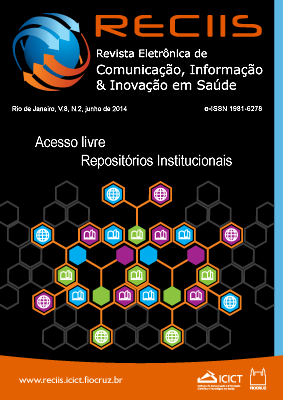Science communication: (r) evolution or crisis?
DOI:
https://doi.org/10.3395/reciis.v8i2.621Keywords:
Scholarly Communication, Open Access, RepositoriesAbstract
Intervening factors such as information and communication technologies, serials crisis, creation of arXiv and implementation of 3B (Budapest, Berlin and Bethesda) are key factors for changing the modes of scholarly communication production. This paper presents a literature review on the issue, focusing on the green road (repositories). It aims to analyze the effects caused by those factors. To achieve this purpose, the resulting consequences of these factors will be verified, as well as the adoption of the green road as an alternative mode of scholarly communication, the evolution of repositories and the actors who benefit from Open Ac cess. The repositories constitute a tool for the unrestricted sharing of knowledge and are an alternative for developing countries to have access to the information published in journals and repositories and also to make the science produced there public. It concludes that changes in the traditional system of scholarly communication reveal the emergence of a new paradigm L Open Access.Downloads
Published
How to Cite
Issue
Section
License
Author’s rights: The author retains unrestricted rights over his work.
Rights to reuse: Reciis adopts the Creative Commons License, CC BY-NC non-commercial attribution according to the Policy on Open Access to Knowledge by Oswaldo Cruz Foundation. With this license, access, download, copy, print, share, reuse, and distribution of articles is allowed, provided that it is for non-commercial use and with source citation, granting proper authorship credits and reference to Reciis. In such cases, no permission is required from the authors or editors.
Rights of authors’s deposit / self-archiving: The authors are encouraged to deposit the published version, along with the link of their article in Reciis, in institutional repositories.












